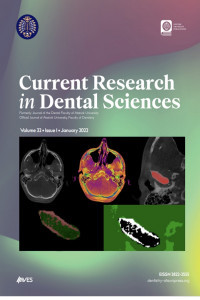GÖRME ENGELLİ BİREYLERDE AĞIZ SAĞLIĞI
görme engeli, körlük, ağız sağlığı, çürük, periodontal hastalık
THE ORAL HEALTH STATUS OF INDIVIDUALS WITH VISUAL IMPAIRMENT
Visual impairment, blindness, oral health, dental caries, periodontal disease,
___
- Resnikoff S, Pascolini D, Etya'ale D, Kocur I, Pararajasegaram R, Pokharel GP, Mariotti SP. Global data on visual impairment in the year 2002. Bull World Health Organ 2004; 82: 844-851.
- World Health Organization, Visual impairment and blindness. factsheets/ fs282/en/ (Erişim tarihi: 06.02.2013).
- Tufan İ, Arun Ö. Türkiye bilimsel ve teknik araştırma kurumu Türkiye özürlüler araştırması. 2. baskı. Ankara: 2006. p. 1-10
- World Health Organization. Prevention of blindness and visual impairment. http://www.who.int/ blindness/ causes/en/ (Erişim tarihi: 02.02.2013).
- Apte RS, Scheufele TA, Blomquist PH. Etiology of blindness in an urban community hospital setting. Ophthalmol 2001; 108: 693–6.
- Greeleg CB, Goldstein PA, Forrester DJ. Oral manifestations in a group of blind students. ASDC J Dent Child 1976; 43: 39-41.
- Sundell SO, Klein H. Toothbrushing behavior in children: a study of pressure and stroke frequency. Pediatr Dent 1982; 4: 225–8.
- Ameer N, Palaparthi R, Neerudu M, Palakuru SK, Singam HR, Durvasula S. Oral hygiene and periodontal status of teenagers with special needs in the district of Nalgonda, India. J Indian Soc Periodontol 2012; 16: 421-5.
- Shyama M, Al-Mutawa SA, Morris RE, Sugathan T, Honkala E. Dental caries experience of disabled children and young adults in Kuwait. Community Dent Health 2001; 18: 181–6.
- Sarı ME, Kalyoncuoğlu E, Çankaya S. Fiziksel engelli çocukların ağız ve diş sağlığı yönünden değerlendirilmesi. Atatürk Üniv Diş Hek Fak Derg 2012; 22: 7-13
- Watson EK, Moles DR, Kumar N, Porter SR. The oral health status of adults with a visual impairment, their dental care and oral health information needs. Br Dent J 2010; 208: 1-6.
- Bozkurt FY, Fentoglu O, Yetkin Z. The Comparison of neuromuscularly disabled individuals. J Contemp Dent Pract. 2004;4:23–31. strategies in
- Akpata ES, Al Shammery AR, Saeed HI. Dental caries, sugar consumption and restorative dental care in 12-13 year old children in Riyadh, Saudi Arabia. Community Dent Oral Epidemiol 1992; 20: 343–6.
- Kumar S, Sharma J, Duraiswamy P, Kulkarni S. Determinants for oral hygiene and periodontal status among mentally disabled children and adolescents. J Indian Soc Pedod Prev Dent 2009; 27: 151–7.
- Jain M, Mathur A, Sawla L, Choudhary G, Kabra K, Duraiswamy P, et al. Oral health status of mentally disabled subjects in India. J Oral Sci 2009; 51: 333–40.
- Keselyak NT, Simmer-Beck M, Bray KK, Gadbury- Amyot CC. Evaluation of an academic service- learning course on special needs patients for dental hygiene students: a qualitative study. J Dent Educ 2007; 71: 378-92.
- Bhandary S, Shetty V, Hedge AM, Rai K. Knowledge of care providers regarding the oral health of visually impaired children. J Clin Pediatr Dent 2012; 36: 411-5.
- Chang CS, Shih Y. Knowledge of dental health and oral hygiene practices of Taiwanese visually impaired and sighted students. J Vis Impair Blind 2004; 98: 1-27
- Scardina GA, Buonamente A, Messina P. Efficacy of an oral health training programme for visually impaired individuals. Ig Sanita Pubbl 2008; 64(4): 509-16.
- Cohen S, Sarnat H, Shalgi G. The role of instruction and a brushing device on the oral hygiene of blind children. Clin Prev Dent 1991; 13: 8-12.
- Smutkeeree A, Rojlakkanawong N, Yimcharoen V. A 6-month comparison of toothbrushing efficacy between the horizontal Scrub and modified Bass methods in visually impaired students. Int J Paediatr Dent 2011; 21: 278-83.
- Başlangıç: 1986
- Yayıncı: Atatürk Üniversitesi
AKTİNOMİKOZ OSTEOMYELİTİNE BAĞLI PATOLOJİK MANDİBULA FRAKTÜRÜ: OLGU SUNUMU
Burak CEZAİRLİ, Kadriye YILDIZ, Celal ÇANDIRLI, Cem ÜNGÖR
FİBRÖZ DİSPLAZİ: BİR OLGU SUNUMU
Binali ÇAKUR, Doğan DURNA, Osman BİLGE, Eren YILDIRIM
GÖRME ENGELLİ BİREYLERDE AĞIZ SAĞLIĞI
Oıuz KÖSE, Alparslan DİLSİZ, Taner ARABACI
PERİODONTAL TEDAVİDE DÜŞÜK DOZ LAZER TEDAVİSİ UYGULAMALARI
LATERAL PERİODONTAL KİST: VAKA RAPORU
Saadettin DAĞISTAN, İ. Şevki BAYRAKDAR
TAM SERAMİKLERİN DİŞHEKİMLİĞİNDEKİ YERİ
TERBİNAFİNE KULLANIMINA BAĞLI TAT DUYUSU BOZUKLUĞU: BİR OLGU SUNUMU
Özlem BAYAR, Gamze ŞENOL GÜVEN, Gülsüm AK
RESTORATİF MATERYALLERİN DENTAL BİYOFİLM ÜZERİNE ETKİLERİ
Elif YAMAN DOSDOĞRU, Arzu PINAR ERDEM, Elif SEPET, Zeynep AYTEPE
İMPLANT DİŞ HEKİMLİĞİNDE KULLANILAN RADYOGRAFİK TEKNİKLERİN CERRAHİ VE PROTETİK TEDAVİDEKİ YARARLARI
